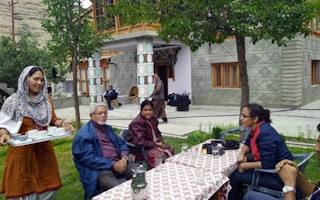No squat-style toilets for old people. Always use white bedsheets. Do not stare at the guests. These are some of the lessons Abida Ghulam Jilani learned as she trained to be a host at her homestay in Pakistan-administered Kashmir.
Jilani is among a growing number of women in South Asia who are opening their homes to guests to earn money, gaining a degree of financial independence and helping to revitalise remote communities and promote sustainable tourism.
The 34-year-old mother-of-five, who left school when she got married aged 18, began hosting visitors in 2019 and charges 2,500 Pakistani rupees ($15) a night.
She has made more than 60,000 rupees since March last year despite the pandemic, allowing her to buy her first washing machine and a giant flat screen TV.
“I can run the place while being at home and looking after my children … I like that,” she said as she made up the bed in the guest room.
“Culturally, we have always been hospitable, but I didn’t know we could earn money like this.”
Jilani’s homestay is one of about 20 under a scheme run by the Himalayan Wildlife Foundation, a Pakistani conservation charity that provides local women with training in hospitality, including etiquette and food presentation.
It is one of a number of such schemes helping women to earn money South Asia, where only about one in four women is in paid employment according to World Bank data - just over half the global figure of 47 per cent.
Renting out rooms gives them a way to run small-scale businesses out of their own homes in places where social mores can make it difficult for women to seek paid employment outside the home.
‘Workcations’
In neighbouring India, where about 30 per cent of Airbnb hosts are female, trade union and industry leaders say women have been disproportionately affected by the coronavirus pandemic when it comes to employment.
Most employed women in India are in low-skilled work, such as farm and factory labour and domestic help, sectors that have been hit hard by strict lockdowns that forced 1.3 billion people to stay home.
But one consequence of those lockdowns has been a boom in domestic tourism as Indians flocked to hill towns and beaches in what the government has termed “revenge travel”.
Amanpreet Singh Bajaj, country manager for Airbnb, said just over half of those who started hosting during the pandemic were women, and they have earned about 30 million Indian rupees ($407,270) since March 2020.
So-called “workcations” and people seeking less crowded places to stay meant there was “a real opportunity for other women to turn their homes into income generating engines”, he said.
For some female hosts, though, the pandemic has been devastating.
Aluthgama Hewa Karunawath borrowed 3 million Sri Lankan rupees ($15,000) in 2019 to extend her house on Unawatuna, a popular beach in southern Sri Lanka, and expand her business renting out two rooms to foreign tourists.
When the pandemic struck, tourism slammed to a halt, leaving her unable to make the repayments.
“I’ve mortgaged my land for the bank loans,” said the 55-year-old. “It would have been better to have died of corona rather than living like this.”
On the other side of the continent, in mountainous Bhutan, Tshering Om was also struggling.
She took a loan in 2018 to bring her home up to government standards for hosting tourists and was accommodating more than 1,000 people a year until the pandemic stopped foreign visitors.
Since then she has had to fire two helpers and start farming to cover basic expenses.
“Without guests, forget repaying the loan, we are not even able to meet the operational costs,” said Om.
‘Changed my life’
In the long term, industry leaders believe homestays will succeed - and that the pandemic may even help.
More than 60 per cent of nearly 30,000 respondents to a survey commissioned by online travel agency Booking.com across 30 countries earlier this year said they would travel more sustainably in future and contribute more to local economies.
Shailza Dasgupta, co-founder of social enterprise Homestays of India, said this type of accommodation fitted the bill, as they are often in remote places where guests “can’t expect to have a long, hot shower”.
“Covid-19 has definitely changed the mental make-up of people when it comes to traveling,” said Dasgupta, who has helped train nearly 200 women to run homestays equipped with solar panels and follow a strict no-plastic rule.
Overall, most South Asian women said hosting visitors had more upsides than downsides.
Veena Dandwal said running her homestay in the northern Indian state of Uttarakhand had helped turn her from a shy mother-of-three who feared talking to strangers to a leader of the village council.
“I have become a lot more confident, smarter and more outgoing. I also have a better understanding of money management now,” said the 40-year-old. “This has changed my life.”
This story was published with permission from Thomson Reuters Foundation, the charitable arm of Thomson Reuters, that covers humanitarian news, climate change, resilience, women’s rights, trafficking and property rights. Visit http://news.trust.org/climate.












